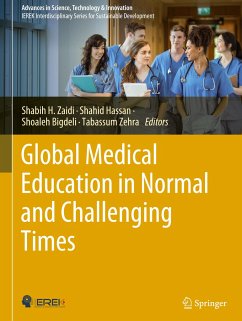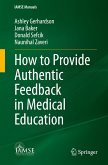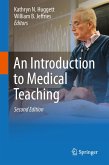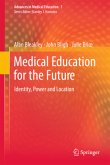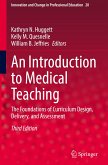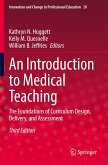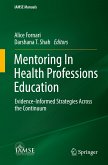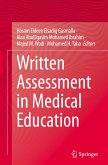Global Medical Education in Normal and Challenging Times
Herausgegeben:Zaidi, Shabih H.; Hassan, Shahid; Bigdeli, Shoaleh; Zehra, Tabassum
Global Medical Education in Normal and Challenging Times
Herausgegeben:Zaidi, Shabih H.; Hassan, Shahid; Bigdeli, Shoaleh; Zehra, Tabassum
- Gebundenes Buch
- Merkliste
- Auf die Merkliste
- Bewerten Bewerten
- Teilen
- Produkt teilen
- Produkterinnerung
- Produkterinnerung
This book is written by several medical educators from developed as well as developing countries based on decades of experience in teaching. The unique experience gained during the COVID-19 pandemic has added new dimensions to the traditional pedagogy, andragogy, and heutagogy, documented here. The salient topics include distance learning, virtual classrooms, virtual workshops on OSCEs, open book exams, micro-learning, micro-credentialing, blended or digitalized curriculum delivery, academic leadership, communication skills, professionalism, telemedicine, bioethics, cyber clinics, artificial…mehr
Andere Kunden interessierten sich auch für
![How to Provide Authentic Feedback in Medical Education How to Provide Authentic Feedback in Medical Education]() Ashley GerhardsonHow to Provide Authentic Feedback in Medical Education43,99 €
Ashley GerhardsonHow to Provide Authentic Feedback in Medical Education43,99 €![An Introduction to Medical Teaching An Introduction to Medical Teaching]() An Introduction to Medical Teaching67,99 €
An Introduction to Medical Teaching67,99 €![Medical Education for the Future Medical Education for the Future]() Alan BleakleyMedical Education for the Future169,99 €
Alan BleakleyMedical Education for the Future169,99 €![An Introduction to Medical Teaching An Introduction to Medical Teaching]() An Introduction to Medical Teaching121,99 €
An Introduction to Medical Teaching121,99 €![An Introduction to Medical Teaching An Introduction to Medical Teaching]() An Introduction to Medical Teaching116,99 €
An Introduction to Medical Teaching116,99 €![Mentoring In Health Professions Education Mentoring In Health Professions Education]() Mentoring In Health Professions Education70,99 €
Mentoring In Health Professions Education70,99 €![Written Assessment in Medical Education Written Assessment in Medical Education]() Written Assessment in Medical Education85,99 €
Written Assessment in Medical Education85,99 €-
-
-
This book is written by several medical educators from developed as well as developing countries based on decades of experience in teaching. The unique experience gained during the COVID-19 pandemic has added new dimensions to the traditional pedagogy, andragogy, and heutagogy, documented here. The salient topics include distance learning, virtual classrooms, virtual workshops on OSCEs, open book exams, micro-learning, micro-credentialing, blended or digitalized curriculum delivery, academic leadership, communication skills, professionalism, telemedicine, bioethics, cyber clinics, artificial intelligence, etc. This book is used as a text or reference book by physicians, teachers, scholars, students, and medical universities for teachers' training, capacity building, and guidance on fundamental pillars of cognitive domains of knowledge, skills, and attitude, as well as factual, conceptual, procedural, and metacognitive skills. It is also a source of guidance in faculty enhancementand toward continued quality improvement in medical education.
Produktdetails
- Produktdetails
- Advances in Science, Technology & Innovation
- Verlag: Springer / Springer Nature Switzerland / Springer, Berlin
- Artikelnr. des Verlages: 978-3-031-51243-8
- 2024
- Seitenzahl: 312
- Erscheinungstermin: 30. Mai 2024
- Englisch
- Abmessung: 285mm x 215mm x 23mm
- Gewicht: 925g
- ISBN-13: 9783031512438
- ISBN-10: 303151243X
- Artikelnr.: 69495866
- Herstellerkennzeichnung Die Herstellerinformationen sind derzeit nicht verfügbar.
- Advances in Science, Technology & Innovation
- Verlag: Springer / Springer Nature Switzerland / Springer, Berlin
- Artikelnr. des Verlages: 978-3-031-51243-8
- 2024
- Seitenzahl: 312
- Erscheinungstermin: 30. Mai 2024
- Englisch
- Abmessung: 285mm x 215mm x 23mm
- Gewicht: 925g
- ISBN-13: 9783031512438
- ISBN-10: 303151243X
- Artikelnr.: 69495866
- Herstellerkennzeichnung Die Herstellerinformationen sind derzeit nicht verfügbar.
Dr. Shabih H. Zaidi is a Surgeon, Medical Educator, and Medical Ethicist, based in London. He has extensive experience in the field of medical education, as he has been teaching since 1972. Over the years , he progressed from Assistant professor to Professor, Chair, Dean, and Vice Chancellor. He is the Founding Chancellor of the Al -Sadiq Virtual University of Health Sciences (SIVU. www.sivu.alsadiquni.com), an iconic project of Medics International, a UN accredited NGO based in Princeton, NJ, USA. Dr. Zaidi has written and published over 200 articles, papers, editorials etc in high-impact indexed journals, and 12 books so far. Three of his last books published by Springer (Vertigo, Ethics in medicine, Teaching and Learning in medicine) have gained much popularity as c60,000 chapters have been downloaded by global knowledge seekers. He is currently engaged in writing a book on Virtue Medical Ethics and Editing an Encyclopaedia of Medical ethics. He pioneered a couple of journals over time and has been on the editorial board of several international journals, where he contributes regularly. The virtual University launched in May 2020 by him , for dissemination of knowledge through e-learning engaging a vast number of medical educators from many countries has now become an entity of considerable repute. A selection of lectures given by global educators in SIVU have been compiled by him and his co-editors in this book, called the Global Medical Education in Normal and Challenging Times. Dr. Shahid Hassan is a qualified and experienced Educator with an MHPE from Maastricht University Netherlands in 2005. He has worked as Medical Educator in University Sains Malaysia (USM), Head of Unit of Medical Education in University Putra Malaysia (UPM), University Sultan Zainal Abidin (UniSZA), and Director, IMU Centre for Education at International Medical University (IMU), Malaysia. He has been awarded with the WIPO and ITEX Gold Medal and Excellent Scientist Award for Innovative research. He has published over 130 research papers and five books. He is an overseas Editor of Pakistan Journal of ORL (PJORL) and Member of Editorial Board of Interdisciplinary Journal of Virtual Learning in Medical Sciences (IJVLMS). He has been the Vice President of Malaysian Association of Educators in Medicine and Health Sciences (MAEMHS) and Lead of Assessment Subgroup of Medical Educators Network (MedNet) Malaysia. Dr. Hassan has supervised more than 20 postgraduate theses in Otolaryngology and medical education and given more than 110 presentations from keynote address to free papers in national and international conferences and conducted more than 35 workshops. He is currently working as Professor and Associate Dean Academic and Head of Medical Education Department American University of Barbados School of Medicine. He is also the Co-director of ERA-SIVU joint Program on HPE for Certificate and Diploma. Dr Hassan's major contribution in recent years has been over 25 international webinars and 10 articles based on unprecedented challenges and experience of the COVID-19 era. His recently published eBook is on, "Design and Development of Survey Questionnaire Using Likert Scale: From Validation to Usability" and yet another eBook in publication is about, Quantitative Research for Educational Study Made Easy: Practical Statistics for Educators. Dr. Shahid Hassan is also an Otorhinolaryngologist with subspecialty in Head and Neck and Thyroid Surgery. Dr. Shoaleh Bigdeli is a Professor at the Department of Medical Education, School of Medicine, and was Vice-director of the Center for Educational Research in Medical Sciences (CERMS) at Iran University of Medical Sciences (2018-2023). She received her doctorate in Curriculum Theories and Implementation from Simon Fraser University (SFU), Canada, as well as several certificates from FAIMER in medical education. Sheis an AMEE Associate Fellow (AFAMEE) and has been awarded in medical education research and teaching nationally and internationally. Dr. Bigdeli has supervised more than 30 postgraduate theses in medical education, given more than 100 presentations at universities and conferences, published more than 90 articles in peer-reviewed journals, and co-authored twelve books and book chapters. She is an editorial board member of several national and international medical education journals, including BMC Medical Education. Dr.Zehra is a PhD in Medical Education from the University Ambrosiana and MHPE from Aga Khan University. Dr Zehra is an Assistant Professor at the Department for Educational Development at The Aga Khan University, Karachi, Pakistan. She is the Director, Master of Health Professions Education Programme at the Aga Khan University and lead faculty development program for health professionals. Dr Zehra is Writer, Author, and Reviewer of several articles published in indexed journals, Invited Speaker in physical and virtual meetings on medical education, and Moderator and Facilitator of numerous webinars and workshops at the Aga Khan University and the Sadiq International Virtual University. Her special interests focus on faculty development, clinical supervision, feedback and Curriculum Development, though her other strength is instructional strategies which she teaches her postgraduate students doing their master's at the illustrious Aga Khan University , Karachi ,Pakistan .
Introduction - Part 1: Educational Concepts and Philosophies.- Part 2: Ready to practice graduates - Part 3: Students' involvement in career guidance.- Part 4: Professional development through interaction.- Part 5: Professionalism & Medical Ethics.- Part 6: Curriculum development - Part 7: Assessment & Evaluation.- Part 8: Learning resources and technology in medical education.- Part 9: Academic leadership.- Part 10: Research and scholarship.- Part 11: Globalisation of medical education.- Part 12: Medical education in the future.- Conclusion: Medical education is an art and a science. It is perpetually evolving. COVID-19 posed unprecedented challenges, enforcing rapid transition from conventional to many innovative techniques. It has changed the traditional method of paternalistic teaching, and synchronous F2F mode to a virtual synchronous/asynchronous mode transcending time and borders. Traditional classes changed to hyper flex formats and educational methodology became embedded with digital technology. Blended teaching is here to stay. We, believe that Medical and Health Professions Educationists (HPE), physicians, scholars, health workers and students, will benefit from this collection of wisdom of experts from several developing and developed countries.
Introduction - Part 1: Educational Concepts and Philosophies.- Part 2: Ready to practice graduates - Part 3: Students' involvement in career guidance.- Part 4: Professional development through interaction.- Part 5: Professionalism & Medical Ethics.- Part 6: Curriculum development - Part 7: Assessment & Evaluation.- Part 8: Learning resources and technology in medical education.- Part 9: Academic leadership.- Part 10: Research and scholarship.- Part 11: Globalisation of medical education.- Part 12: Medical education in the future.- Conclusion: Medical education is an art and a science. It is perpetually evolving. COVID-19 posed unprecedented challenges, enforcing rapid transition from conventional to many innovative techniques. It has changed the traditional method of paternalistic teaching, and synchronous F2F mode to a virtual synchronous/asynchronous mode transcending time and borders. Traditional classes changed to hyper flex formats and educational methodology became embedded with digital technology. Blended teaching is here to stay. We, believe that Medical and Health Professions Educationists (HPE), physicians, scholars, health workers and students, will benefit from this collection of wisdom of experts from several developing and developed countries.

